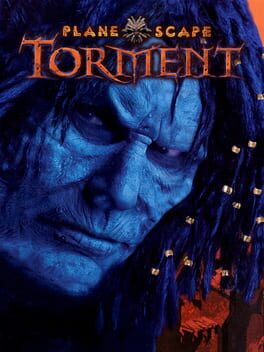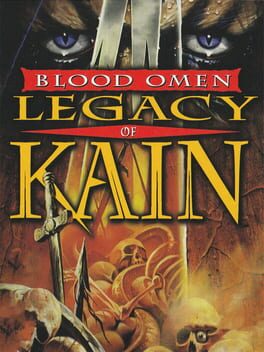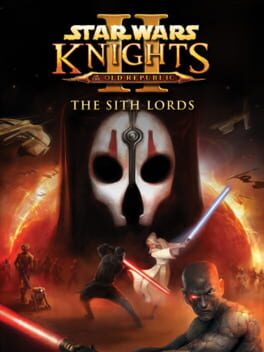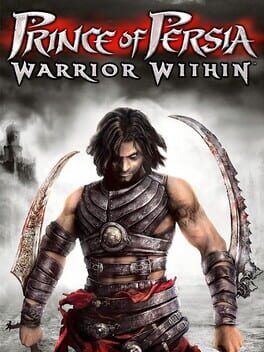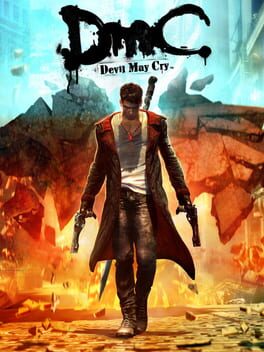neurodrive
Bio
Sybreed is intrinsically hyperstitional and beyond your comprehension. You need to go back to listening to that Fear Factory garbage and reminiscing over your failed relationship with God.
Sybreed is intrinsically hyperstitional and beyond your comprehension. You need to go back to listening to that Fear Factory garbage and reminiscing over your failed relationship with God.
Badges

Well Written
Gained 10+ likes on a single review

Liked
Gained 10+ total review likes

Best Friends
Become mutual friends with at least 3 others

N00b
Played 100+ games

Noticed
Gained 3+ followers
Favorite Games
137
Total Games Played
000
Played in 2024
000
Games Backloggd
Recently Reviewed See More
Enter November 2004. Linkin Park's 'Meteora' was released over a year ago. We are approaching peak nu-metal. Effeminate yet hypermasculine bands screaming their angst to the pattern of 0-3-5 guitar riffs have a stranglehold on the youth. Although the 90s effectively killed edge with poor marketing campaigns - John Romero did not make us his bitch - the aughties couldn't resist a flirtatious dance with our shadow selves. Having signed up with Stuart Chatwood, Ubisoft endeavoured to make a timeless Iranian metal classic wrapped in the skin of a video game. For those who believe 'authentic Persian aesthetics' must resemble a Disney movie, this is processed as mere 'heavy metal' - seen to be a jarring tonal shift away from the idyllic fantasy of despotic regimes sporting a human face. Their suffering is intensified by Godsmack being nominally involved with this entry: the instrumental version of 'I Stand Alone' making its way into Dahaka chase sequences - their music generally present across the marketing trailers for this game; trailers that are wonderfully crafted like any semi-professional AMV typical of 2004.
"I can't control you: you're not my destiny." The title credits rolling to the tune of 'Straight Out Of Line' act as a mission statement: You will bathe in individualistic ultra-edge, and you shall enjoy it. What's striking are the cherry-picked moments of controversy that precipitated this game's launch. BDSM-themed enemies who masochistically get off to you killing them sparked no reaction. Nobody observed the fact that every character is deeply sociopathic, angry, and self-centred. What sparked the ire of mother culture nerds scared of feeling emotions was the Prince uttering the lines: "You bitch!" It seems we will never be free from the curse of middle-class morality.
Although I oppose self-insert characterization, I have to confess something: the Prince is exactly like me. You see, I too know what it's like to have my midlife crisis confused for teenage angst. What is understood by spiritual jarheads to be free-floating rebellion is actually the weight of trauma and hardship bearing down on one's soul. When this condition commingles with a warrior's spirit, metastasizing your fight-or-flight reflex across the entire body, a certain pulverization of spirit obtains - the existential mineralization fed by tooth decay and atrophied bone density. Such is the imagery invoked by the subtitle: 'Warrior Within.' This is a surprisingly uplifting message for a game otherwise drenched in tonal darkness, but for yuppified comfort addicts, legitimate struggles are a myth. There is only the dissatisfied whine of ingrates and malcontents. Recalling superfluous internet memes boosted by hypernormies: that every expression of anguish is tantamount to screaming at your factory-ready mother and caretaker.
The sneering ignorance of the privileged and the dead aside, 'Warrior Within' tells an intelligent tale on par with mainline Legacy of Kain entries. It expects us to intuitively understand psychological bifurcation, the routine possibility of holding unspoken goals in mind. It doesn't expect us to apply ultra-naive 3D spacetime to every twist and turn in the story - it recognizes that the philosophy of time is a complicated affair. Should you be corrupted with some Cinema Sins neurotype, the plot beats will agonize you. As if the Prince's expository monologues are not enough, you will cry for formal explanations - your narrative choccy milk and nuggies to keep your clockwork brain well-oiled and safe from novel stimuli.
Unlike many ill-fated conceptual reboots, the Prince of Persia fan base grew up with 'Warrior Within.' As they grew into angry middle-aged men fighting fatal odds, the delicate craftsmanship once derided as 'edgy' became strikingly quaint. For this game is the product of French degenerates for whom Marquis de Sade is tame and normalized - they understand that blood and grit adds authenticity to a setting, provided it is done with a certain level of respect and literary attentiveness.
As a result, the free-form combat system and innovative platforming fade into the background of ultravibe. What one remembers about 'Warrior Within' is a flurry of emotion - loneliness, isolation, anger, melancholy. Everything from the Prince's evolved backstory, to the muted colour palette, and hostile rewilding of Iranian architecture services this cluster of moods. It is a truly unforgettable entry, certain to cement itself in your mind - even if you should be a Marvel Adult who rejects every artistic priority baked into 'Warrior Within.' For a culture spiralling into self-parody with its relentless opposition to sincerity and exuberance, this antipodal game is certain to continuously revitalize itself within that cultural memory. A shadow chasing the sons of plunder, leaving enchantment wherever they demystify and desacralize our darkest dreams.
"I can't control you: you're not my destiny." The title credits rolling to the tune of 'Straight Out Of Line' act as a mission statement: You will bathe in individualistic ultra-edge, and you shall enjoy it. What's striking are the cherry-picked moments of controversy that precipitated this game's launch. BDSM-themed enemies who masochistically get off to you killing them sparked no reaction. Nobody observed the fact that every character is deeply sociopathic, angry, and self-centred. What sparked the ire of mother culture nerds scared of feeling emotions was the Prince uttering the lines: "You bitch!" It seems we will never be free from the curse of middle-class morality.
Although I oppose self-insert characterization, I have to confess something: the Prince is exactly like me. You see, I too know what it's like to have my midlife crisis confused for teenage angst. What is understood by spiritual jarheads to be free-floating rebellion is actually the weight of trauma and hardship bearing down on one's soul. When this condition commingles with a warrior's spirit, metastasizing your fight-or-flight reflex across the entire body, a certain pulverization of spirit obtains - the existential mineralization fed by tooth decay and atrophied bone density. Such is the imagery invoked by the subtitle: 'Warrior Within.' This is a surprisingly uplifting message for a game otherwise drenched in tonal darkness, but for yuppified comfort addicts, legitimate struggles are a myth. There is only the dissatisfied whine of ingrates and malcontents. Recalling superfluous internet memes boosted by hypernormies: that every expression of anguish is tantamount to screaming at your factory-ready mother and caretaker.
The sneering ignorance of the privileged and the dead aside, 'Warrior Within' tells an intelligent tale on par with mainline Legacy of Kain entries. It expects us to intuitively understand psychological bifurcation, the routine possibility of holding unspoken goals in mind. It doesn't expect us to apply ultra-naive 3D spacetime to every twist and turn in the story - it recognizes that the philosophy of time is a complicated affair. Should you be corrupted with some Cinema Sins neurotype, the plot beats will agonize you. As if the Prince's expository monologues are not enough, you will cry for formal explanations - your narrative choccy milk and nuggies to keep your clockwork brain well-oiled and safe from novel stimuli.
Unlike many ill-fated conceptual reboots, the Prince of Persia fan base grew up with 'Warrior Within.' As they grew into angry middle-aged men fighting fatal odds, the delicate craftsmanship once derided as 'edgy' became strikingly quaint. For this game is the product of French degenerates for whom Marquis de Sade is tame and normalized - they understand that blood and grit adds authenticity to a setting, provided it is done with a certain level of respect and literary attentiveness.
As a result, the free-form combat system and innovative platforming fade into the background of ultravibe. What one remembers about 'Warrior Within' is a flurry of emotion - loneliness, isolation, anger, melancholy. Everything from the Prince's evolved backstory, to the muted colour palette, and hostile rewilding of Iranian architecture services this cluster of moods. It is a truly unforgettable entry, certain to cement itself in your mind - even if you should be a Marvel Adult who rejects every artistic priority baked into 'Warrior Within.' For a culture spiralling into self-parody with its relentless opposition to sincerity and exuberance, this antipodal game is certain to continuously revitalize itself within that cultural memory. A shadow chasing the sons of plunder, leaving enchantment wherever they demystify and desacralize our darkest dreams.
Devil May Cry is an awkward weebslop series made by auspecial people and for auspecial people. DmC: Devil May Cry, on the other hand, is the feverish dream of a drug addict who has old blueprints of their high school lying around. We can borrow the nomenclature of YouTube's famous verbal blackface actor and call this a Kirkbride-type reboot. The Kirkbride mindset delineates the rarest way to reboot a series. It involves deep study of the source material, making new connections that are best seen through amphetamine-induced hyperconcentration - a phenomenological dance with schizophrenia, giving neuronormies novel ways to access the text of reality. DmC: Devil May Cry is a forbidden experiment with this dark creative impulse and, as a result, legions of straight edge mouth breathers have made their dissatisfaction known.
Having decided that profanity and cigarettes are cool, DmC provides a welcome surrealist punk twist on an aesthetically barren universe. When your frame of reference is shallow due to your sensory processing differences, subtle aesthetic clues like the overuse of expletives may be lost on you - leading to a childish outcry that the Succubus encounter is 'edgy' and 'forced.' While this, of course, describes an intentional characteristic of the stand-offish dialogue, no amount of creative license can justify failing to replicate award-winning performances known to the original series. Did anyone else get goosebumps when sXe-Dante yelled: "I should have been the one to fill your dark soul with light!" Simply epic.
None of that can be found in DmC: Devil May Cry. We instead find a frighteningly bold aesthetic direction - one that can induce symptoms of sensory overload if you have forgotten to take your Abilify. You will spend most of the game interfacing with the real-world by proxy - residing in 'Limbo,' which will bathe the world in orange and teal to maximize that pre-vaporwave vibe. It is admittedly true that every design decision feels carefully considered by an intelligent - and suspiciously neurotypical - mind, but much like a gifted child who screams when the coffee maker has moved to the other side of the countertop, fans of the original series can only notice one thing: nu-Dante is a different character.
This mind-blowing exposition of such a subtle design change aside, many fans of the original series will admit that while, yes, DmC delivers a killer soundtrack, innovative visuals, prescient environmental storytelling, and an impressively cinematic take on moment-to-moment gameplay, it has one unfortunate flaw: the fighting mechanics are simple this time around. While in the grand scheme of things this objection is akin to complaining that Call of Duty 4 fails to sport an Arena FPS weapon arsenal, I have been assured that this is a deal breaker. I suppose one can tolerate the sterile and bland environmental palette of Devil May Cry 3 when the world is but an excuse to achieve your 9-step combos.
DmC: Devil May Cry is ambitious, daring, and incomplete - Ninja Theory would not find their footing until Hellblade: Senua's Sacrifice. Sparks of their future brilliance can be found in this controversial entry, however, knocking over the rigidly designed sand castles of people who adhere to strict male social roles. If you want to deeply appreciate the fact that gamers despise art and desire only an industry of consumer wish fulfillment, give this game a spin and then speak about your experience online. You have nothing to lose but your sense of kinship with other human-beings.
Having decided that profanity and cigarettes are cool, DmC provides a welcome surrealist punk twist on an aesthetically barren universe. When your frame of reference is shallow due to your sensory processing differences, subtle aesthetic clues like the overuse of expletives may be lost on you - leading to a childish outcry that the Succubus encounter is 'edgy' and 'forced.' While this, of course, describes an intentional characteristic of the stand-offish dialogue, no amount of creative license can justify failing to replicate award-winning performances known to the original series. Did anyone else get goosebumps when sXe-Dante yelled: "I should have been the one to fill your dark soul with light!" Simply epic.
None of that can be found in DmC: Devil May Cry. We instead find a frighteningly bold aesthetic direction - one that can induce symptoms of sensory overload if you have forgotten to take your Abilify. You will spend most of the game interfacing with the real-world by proxy - residing in 'Limbo,' which will bathe the world in orange and teal to maximize that pre-vaporwave vibe. It is admittedly true that every design decision feels carefully considered by an intelligent - and suspiciously neurotypical - mind, but much like a gifted child who screams when the coffee maker has moved to the other side of the countertop, fans of the original series can only notice one thing: nu-Dante is a different character.
This mind-blowing exposition of such a subtle design change aside, many fans of the original series will admit that while, yes, DmC delivers a killer soundtrack, innovative visuals, prescient environmental storytelling, and an impressively cinematic take on moment-to-moment gameplay, it has one unfortunate flaw: the fighting mechanics are simple this time around. While in the grand scheme of things this objection is akin to complaining that Call of Duty 4 fails to sport an Arena FPS weapon arsenal, I have been assured that this is a deal breaker. I suppose one can tolerate the sterile and bland environmental palette of Devil May Cry 3 when the world is but an excuse to achieve your 9-step combos.
DmC: Devil May Cry is ambitious, daring, and incomplete - Ninja Theory would not find their footing until Hellblade: Senua's Sacrifice. Sparks of their future brilliance can be found in this controversial entry, however, knocking over the rigidly designed sand castles of people who adhere to strict male social roles. If you want to deeply appreciate the fact that gamers despise art and desire only an industry of consumer wish fulfillment, give this game a spin and then speak about your experience online. You have nothing to lose but your sense of kinship with other human-beings.

